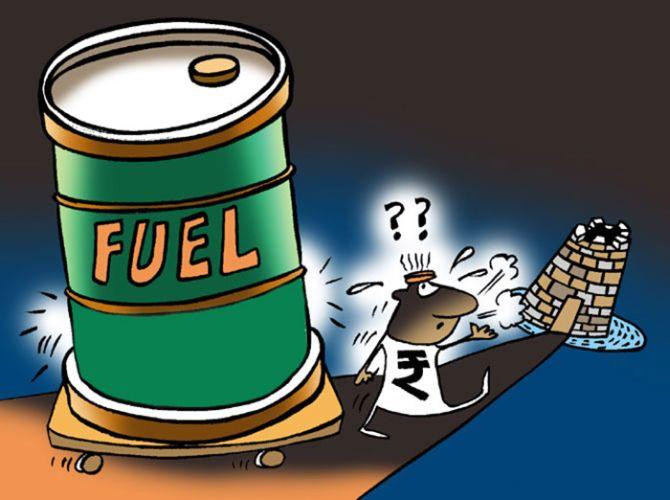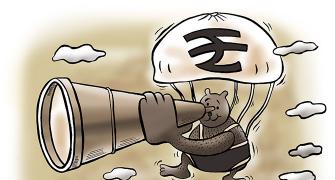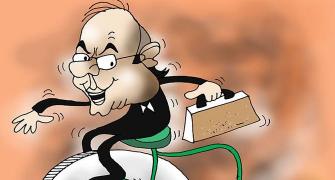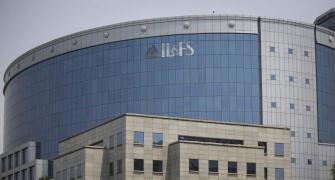The benchmark Indian crude oil basket is now estimated to average $77.88 a barrel for FY19, compared to the government's earlier estimate of $65 a barrel for the year and $56.39 for FY18
Illustration: Uttam Ghosh/Rediff.com

The crude oil import bill for India is expected to increase by $37 billion to $125 billion during the current financial year (2018-19, or FY19) - a 42 per cent spike over the 2017-18 (FY18) bill of $88 billion.
The latest estimates were released by the Petroleum Planning and Analysis Cell (PPAC) on Monday.
The previous estimate for the year was $105 billion. Rising crude oil prices and a weak rupee are the main reasons for this rise.
The benchmark Indian crude oil basket is now estimated to average $77.88 a barrel for FY19, compared to the government’s earlier estimate of $65 a barrel for the year and $56.39 for FY18.
During the initial estimates by the PPAC, the exchange rate for the rupee was presumed to be 65 a dollar.
On Monday, the exchange rate was Rs 73.52 a dollar, and it has hovered around Rs 72.22 a dollar in the second half of the financial year.
In rupee terms, the estimated increase in the import bill will be Rs 5.66 trillion. Last year, it was Rs 8.81 trillion.
With global crude oil prices rising over the past two months, retail prices of petrol, diesel and liquefied petroleum gas have also scaled new highs, forcing the government to cut excise duty on October 4.
“The current situation will have an impact on our trade deficit and fiscal deficit, and our foreign exchange (forex) reserves will continue to deplete.
"The government should take immediate and stringent steps related to petroleum conservation, encouraging of renewable fuels, and increasing the share of gas in the energy basket, as domestic production increase and cut in imports by 10 per cent may take some time to materialise,” said Deepak Mahurkar, partner and leader (oil and gas), PwC India.
For every $1 increase in crude oil prices, the impact on the current account deficit (CAD) is likely to be $1 billion.
Based on estimates, the CAD is expected to widen to $72-77 billion (2.8 per cent of gross domestic product or GDP) in FY19, from $48.7 billion in 2017-18 (1.9 per cent of GDP).
India’s forex reserves saw its biggest single-week fall in seven years, by $5.14 billion to $394.46 billion in the week ended October 12.
This will be the first time that the crude oil import bill will cross the $100-billion mark in three years.
It was $140 billion for consecutive three years starting 2011-12.
Prime Minister Narendra Modi-led government would also be worried because of the increase in consumption of crude between April and September by 5.8 per cent to 113 million tonnes (mt) this year.
For the same period last year, it was 106.8 mt.
In FY19, the total consumption is likely to be 228.6 mt, up from 220 mt in FY18.
On Monday, the price of Brent crude was $79.89 a barrel at one point, while the Indian basket price was $78.81 a barrel.
Every $1 a barrel increase in crude oil may transform to an increase of 63 paise per litre of petrol and diesel, while a depreciation of Rs 1 per dollar may require a spike of 50 paise on both fuels.
According to a Bloomberg survey, the rupee is likely to resume its losses, touching 76.50 per dollar.










